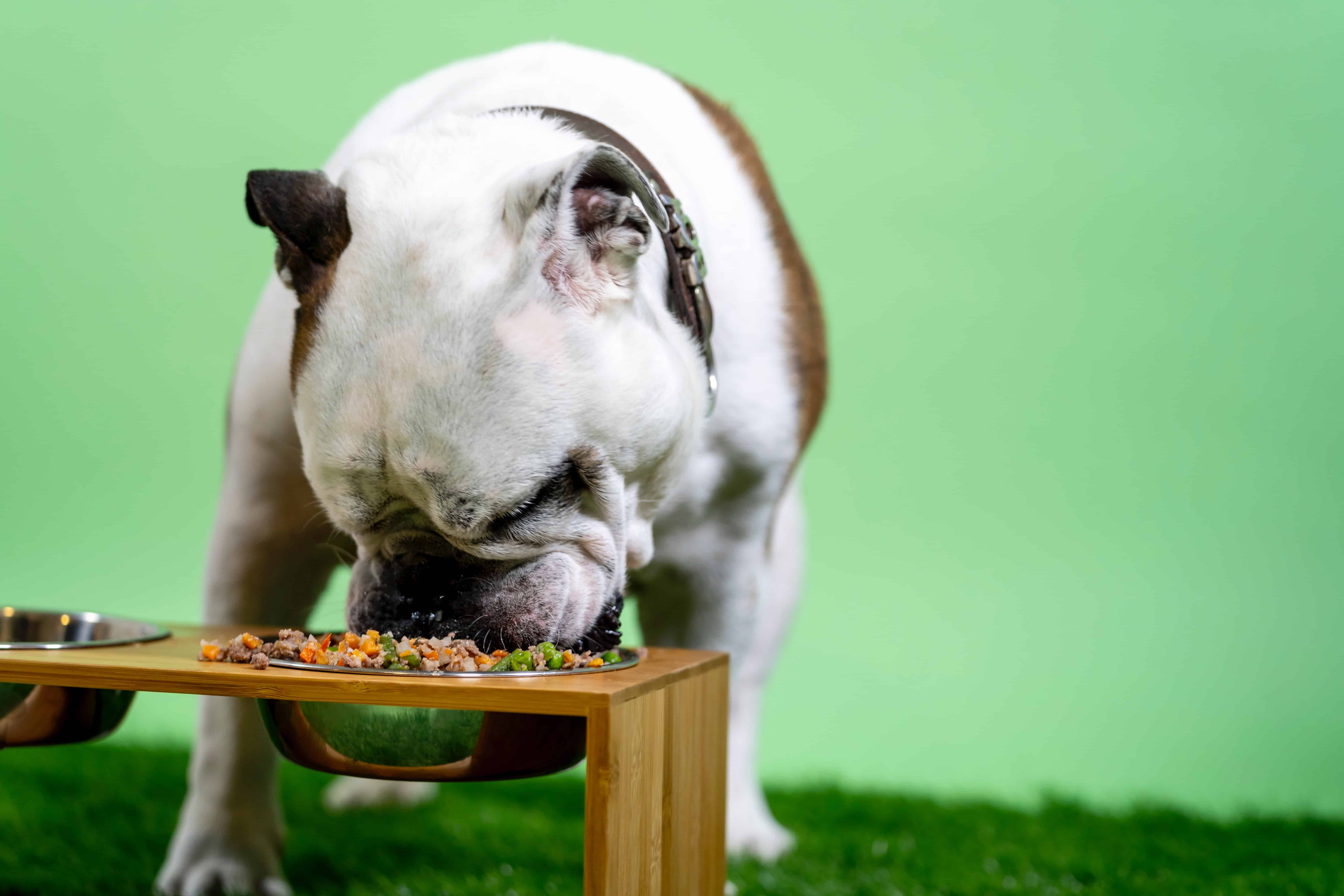
Dogs of any age need a nutritious, nutrient-rich diet. It’s vital for senior pets. Being careful of what and how much your senior dog consumes can help manage aging concerns, such as obesity. High-quality specialty dog foods are available but they can be pricey. You can control what goes into homemade dog food and save money compared to commercial brands. If your dog is missing nutrients, supplements can help.
If your dog has lost some interest in life or is a picky eater, making his or her food at home can make a big difference. It can also be used to treat illnesses that are common in older dogs. But it is very important to make sure the food is complete and healthy. If not, your dog might not be as healthy as he is when he eats dry dog food.
Seniors Nutritional Needs
All dogs, in general, need the same basic things in their diets. Protein, fats, and carbs are all things your dog needs to stay healthy. You’ll have to make some changes for your old dog, though. As your dog gets older, he still needs the same amount of protein, but his metabolism will slow down. That means he’ll need to eat the same amount of protein but less food overall. Add more fiber, cut back on carbs, and use lean protein sources like chicken, fish, lamb, or very lean beef.
Be aware of any food allergies or dietary restrictions and talk to your vet before giving your dog homemade food, especially if he or she has a health problem. You may also need to change the amount of protein, grains, and vegetables in your dog’s food to meet his or her needs. So, here are a few favorite recipes for making homemade dog food for older dogs that are both tasty and safe.
Brown Rice, Turkey, and Veggies
This recipe for a simple, healthy meal of brown rice, turkey, and vegetables is one of many fantastic homemade dog food recipes that have been certified by veterinarians. The mixture can be frozen or stored in the refrigerator for up to five days (the recipe yields around 12 cups).
Ingredients:
- 1 lb ground turkey
- 2 cups brown rice
- 1 tsp dried rosemary
- ½ package frozen broccoli, carrots, and cauliflower (alternatively sauté 2 cups of fresh vegetables for 4 minutes until soft but firm)
- 6 cups water
Directions:
- In a pot, combine water, rice, ground turkey, and rosemary.
- Stir to break up the turkey and mix the ingredients.
- Bring to a boil and simmer for 20 minutes.
- Add frozen or fresh veg. Cook for 5 minutes.
- Let the mixture cool before serving.
Beef Stew
Ingredients:
- 1 lb beef stew meat
- 1 small sweet potato
- ½ cup diced carrots
- ½ cup diced green beans
- ½ cup flour
- ½ cup water
- 1 tbsp organic vegetable oil
Directions:
- Cook the sweet potato for 5 to 8 minutes until tender but firm.
- Cut the beef stew meat into nickel-sized bits.
- In a big pan, heat the oil on medium. Add stew chunks and simmer for 10 to 15 minutes until done.
- Take out the beef and save the drippings.
- Dice the cooked sweet potato.
- Turn the heat to medium-low and heat the drippings. Slowly whisk in flour and water to form a thick gravy.
- Coat sweet potato, pork, green beans, and carrots in gravy.
- Cook carrots for 10 minutes or until tender.
- Cool the stew before serving to your senior dog.
- Leftovers last five days in the fridge.
Chicken Casserole
Cabbage has antioxidants that are good for older dogs, but it can also make them have gas. If this is a problem, you might want to cut back on how much the recipe says to use. Spinach is safe for dogs, but not all of them like it, so make changes as needed.
Ingredients:
- 4 pieces boneless chicken with skin
- ½ cup carrots, peeled and sliced
- 1 cup cabbage
- 1 cup broccoli
- ½ cup green beans
- ½ cup spinach
- 1 ½ cups brown rice
- 2 tbsp olive oil
Directions:
- Steam vegetables until they’re practically mashed. Set them aside when done.
- While the veggies cook, cover the chicken in a pot in water. Water should be 1 inch over the chicken.
- Bring the kettle to a slow boil and boil the chicken for 20 to 30 minutes, or until done.
- Remove the cooked chicken but save the broth.
- Cook brown rice with chicken broth.
- Remove chicken skin and dice chicken and steamed vegetables.
- Mix the cooked rice, vegetables, chicken, and olive oil in a big bowl. Add chicken broth.
- Before serving your dog, let the casserole cool. In a sealed container, leftovers can be refrigerated for three days.
Peanut Butter and Banana Dog Biscuits
There can’t be a list of homemade dog food recipes without a treat. Moderation is key if you want to watch your senior dog’s weight, but these peanut butter and banana dog biscuits are great for a special treat.
Ingredients:
- 1 egg
- 1/3 cup creamy peanut butter
- ½ cup mashed banana
- 1 tablespoon honey
- 1 cup whole wheat flour
- ½ cup wheat germ (can also try oats instead if your dog isn’t a fan of wheat germ)
- 1 lightly beaten egg white for the egg wash
Directions:
- Preheat oven to 300°F (150 degrees Celsius). Lightly grease cookie sheets.
- Peanut butter, egg, banana, and honey in a bowl. Mix wheat germ and flour. Roll out the dough to 14 inches thick on a floured board. Cut with a cookie cutter. Brush the biscuits with beaten egg white.
- Bake the biscuits for 30 minutes, or until golden brown. Put them on a rack to cool.
Challenges and Pitfalls of Making Your Own Dog Food
If making homemade dog food is so great, why don’t vets recommend it more and why don’t all dog owners make their dogs’ food? There are a few good reasons…
Unbalanced diets
It’s very common for pet owners who mean well to feed their pets only meat and starch that they made themselves. Most people don’t think about all the things that this kind of diet lacks.
Veterinarians worry about diets that aren’t well-balanced. Veterinarians don’t want to see dogs with rickets from not getting enough calcium or skin diseases from not getting the right amount of essential fatty acids. So vets usually tell people to buy commercial dog food instead of cooking it themselves.
Time & Storage Issues
It’s a lot easier to just grab a big bag of dry kibble off the shelf at the grocery store than to go to a bunch of different stores to get all the ingredients you need to cook at home. Then there’s the fact that you have to cook every day for your dog.
And many people don’t have enough room in their freezers to cook enough dog food for a month ahead of time.
Supplements
To make sure your older dog gets all the vitamins and minerals he needs, you could add a few drops of a vitamin supplement. Omega-3s are another supplement you can give your dog that will help keep his joints and heart healthy and keep his coat soft and shiny.
Talk To Your Vet
Once you know what to add to your dog’s homemade meals, consult your vet for recommendations on foods and nutrients based on his health. Certain medical concerns like renal illness, heart disease, or diabetes may impact what components you can use and how much. Show your vet the recipe you want to use. He’s also the one to ask about vitamins. A dog’s age doesn’t mean he has a vitamin deficiency. Instead of overdosing your dog with vitamins, add them to his meals.
FREQUENTLY ASKED QUESTIONS:
Does Your Senior Dog Need Fewer Calories?
Obesity is common among pets in the US. Older dogs are more likely to be obese than their younger counterparts. Not only have they had more years of overeating highly digestible food, but they also burn fewer calories due to inactivity.
Get an honest weight estimate from your vet. Ask your vet about your dog’s ideal weight if he needs to shed weight. Ask them how long weight loss should take.
An elderly dog who loses weight could live longer. It will make those years better.
Do Senior Dogs Need More Protein?
Both the AAFCO nor the NRC do not have official recommendations for food for senior dogs. Instead, they belong to the group of Adult Dogs.
The word “senior” on dog food is made up by the company that makes it. There is no set standard for food for older dogs. Some foods have less protein than food for adults, and others have more.
There is still a lot we don’t know about what older dogs need to eat.
But several clinical studies have shown that healthy older adult dogs don’t need more protein than younger adult dogs.
Veterinarian nutritionists currently believe that healthy older dogs don’t need more protein than younger dogs. Most good dog food for adults has a lot of protein for older dogs.


